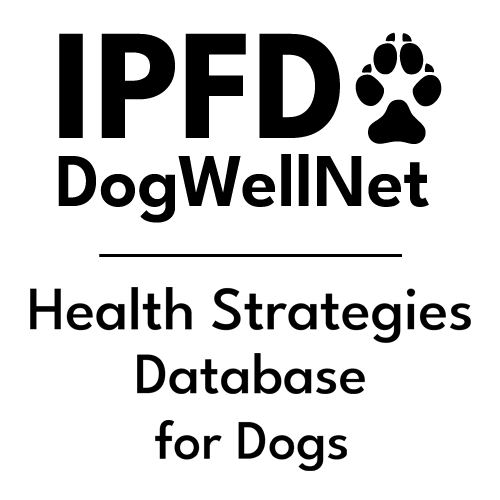Press Release: International Partnership for Dogs (IPFD) Launches Health Strategies Database for Dogs

- In other cases, health testing or other consideration of the condition may be ‘recommended (R2)’ or
- It may be that the condition is simply on the radar of breed representatives, and it is ‘recognized (R3) as a potential issue in the breed.
Press Release:
International Partnership for Dogs (IPFD) Launches Health Strategies Database for Dogs
JUNE 2023 — The International Partnership for Dogs has launched the Health Strategies Database for Dogs (HSDD), a free, searchable database that includes breed-specific health/mentality testing requirements and recommendations established by Health Strategy Providers (HSPs) around the world. The HSPs include kennel clubs, breed clubs, veterinary organizations, and others.
Searchable by Breed, Condition, or Health Strategy Provider, the new database provides an international snapshot of work being done to identify health and temperament issues of concern for a given breed.
“The new HSDD database promises to be a unique and valuable tool for a broad range of stakeholders in the dog world,” says IPFD Chair Dr. Pekka Olson. “Coupled with information on genetic tests available in IPFD’s Harmonization of Genetic Testing for Dogs (HGTD), the new HSDD resource will allow owners, breeders, and those counseling them to have easy access to the ‘Big Picture’ for breeds so that all relevant conditions are considered.”
Breed-specific health testing strategies are created by the groups responsible for the sustainable health and welfare of a breed – generally kennel clubs and (national) breed clubs. These groups examine the evidence available on the occurrence, severity, commonness, heritability, and overall importance of various conditions known to occur within a breed. They then determine whether there are health tests or other management considerations, i.e., predispositions for developing health issues for which there are no pre-breeding tests available to characterize the sire and dam, and/or puppies, to provide information to direct breeding decisions by breeders.
Health Strategy Providers (HSPs) have different goals, different priorities, and different authority in terms of recommending or requiring health testing and may design different strategies. Some have long lists of conditions of interest, some shorter lists. This depends also on the breed.
Those HSPs who control registration of dogs/puppies or who control membership to a group (e.g., OFA CHIC registration) may make some these health screening tests mandatory (required, R1 in HSDD breed charts) for e.g., hip dysplasia screening in many breeds.
Health conditions included in the breed listings are those covered in the Nordic countries’ breed-specific breeding programs (RAS & JTO), obtained via links to US breed clubs’ use of OFA CHIC testing information, concerns addressed in the UK’s Breed Conservation Plans, and from an array of impactful health & welfare tools, programs, and initiatives.
There is a breed-specific component to the frequency of disorders in particular dog breeds or in ‘groups’ of dogs; for example, large sized dogs, working breeds, herding breeds, short-muzzled or short-legged breeds’ groups can have similar health disorders or shared welfare management concerns.
Using a breed-specific approach to identify which health issues occur in a breed and how many dogs are impacted by a given condition(s) guides any breed manager’s focus and efforts to address and improve the situation for individual dogs and the breeds at a population level.
In the HSDD, conditions are listed as general categories (to provide a manageable presentation); details of specific conditions are contained within the breed-specific data provided by HSPs. More information is available by following URLs to the HSP.
“This database has been years in the making, and we extend a very special thanks to Jenni Uski and our former CEO Dr. Brenda Bonnett for their efforts in making it a reality!” says IPFD CEO Marc Ralsky. “We also thank those organizations who kindly provided their information for our database and invite other Health Strategy Providers to submit theirs as well.”
About the International Partnership for Dogs
The International Partnership for Dogs (IPFD) is a non-profit organization leading a global, multi-stakeholder effort to address issues affecting dog health, well-being, and welfare. Our main platform is DogWellNet.com. Our people include a Board comprised of individuals with respected international reputations, and a small but committed team of consultants in several countries. Volunteers from our Partners and Collaborator organizations and a network of experts are integral to what we do.
Our Contributors, Partners, and Sponsors include national kennel clubs, international cynological organizations, groups with breed specific interests, educational/academic and professional organizations, and key players in the pet industry. Together we foster collaborative action to achieve our shared goals, support human-animal interactions, and benefit all dogs worldwide.
For More Information:
Health Strategies Database for Dogs (HSDD)
Harmonization of Genetic Testing for Dogs (HGTD)
About the International Partnership for Dogs (IPFD)
Contacts:
Katariina Mäki, IPFD Business and Project Coordinator katariina.maki@ipfdogs.com
Marc Ralsky, IPFD CEO marc.ralsky@ipfdogs.com
Report Entry
 Donate
Donate
Recommended Comments
There are no comments to display.
Join the conversation
You can post now and register later. If you have an account, sign in now to post with your account.
Note: Your post will require moderator approval before it will be visible.